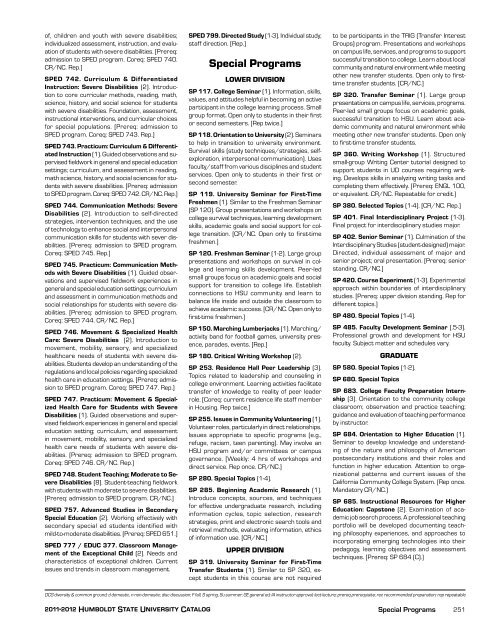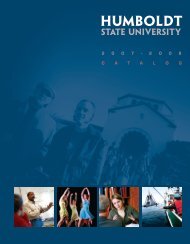2011-12 Academic Year - Bad Request - Humboldt State University
2011-12 Academic Year - Bad Request - Humboldt State University
2011-12 Academic Year - Bad Request - Humboldt State University
Create successful ePaper yourself
Turn your PDF publications into a flip-book with our unique Google optimized e-Paper software.
of, children and youth with severe disabilities;<br />
individualized assessment, instruction, and evaluation<br />
of students with severe disabilities. [Prereq:<br />
admission to SPED program. Coreq: SPED 740.<br />
CR/NC. Rep.]<br />
SPED 742. Curriculum & Differentiated<br />
Instruction: Severe Disabilities (2). Introduction<br />
to core curricular methods, reading, math,<br />
science, history, and social science for students<br />
with severe disabilities. Foundation, assessment,<br />
instructional interventions, and curricular choices<br />
for special populations. [Prereq: admission to<br />
SPED program. Coreq: SPED 743. Rep.]<br />
SPED 743. Practicum: Curriculum & Differentiated<br />
Instruction (1). Guided observations and supervised<br />
fieldwork in general and special education<br />
settings; curriculum, and assessment in reading,<br />
math science, history, and social sciences for students<br />
with severe disabilities. [Prereq: admission<br />
to SPED program. Coreq: SPED 742. CR/NC. Rep.]<br />
SPED 744. Communication Methods: Severe<br />
Disabilities (2). Introduction to self-directed<br />
strategies, intervention techniques, and the use<br />
of technology to enhance social and interpersonal<br />
communication skills for students with sever disabilities.<br />
[Prereq: admission to SPED program.<br />
Coreq: SPED 745. Rep.]<br />
SPED 745. Practicum: Communication Methods<br />
with Severe Disabilities (1). Guided observations<br />
and supervised fieldwork experiences in<br />
general and special education settings; curriculum<br />
and assessment in communication methods and<br />
social relationships for students with severe disabilities.<br />
[Prereq: admission to SPED program.<br />
Coreq: SPED 744. CR/NC. Rep.]<br />
SPED 746. Movement & Specialized Health<br />
Care: Severe Disabilities (2). Introduction to<br />
movement, mobility, sensory, and specialized<br />
healthcare needs of students with severe disabilities.<br />
Students develop an understanding of the<br />
regulations and local policies regarding specialized<br />
health care in education settings. [Prereq: admission<br />
to SPED program. Coreq: SPED 747. Rep.]<br />
SPED 747. Practicum: Movement & Specialized<br />
Health Care for Students with Severe<br />
Disabilities (1). Guided observations and supervised<br />
fieldwork experiences in general and special<br />
education setting; curriculum, and assessment<br />
in movement, mobility, sensory, and specialized<br />
health care needs of students with severe disabilities.<br />
[Prereq: admission to SPED program.<br />
Coreq: SPED 746. CR/NC. Rep.]<br />
SPED 748. Student Teaching; Moderate to Severe<br />
Disabilities (8). Student-teaching fieldwork<br />
with students with moderate to severe disabilities.<br />
[Prereq: admission to SPED program. CR/NC.]<br />
SPED 757. Advanced Studies in Secondary<br />
Special Education (2). Working effectively with<br />
secondary special ed students identified with<br />
mild-to-moderate disabilities. [Prereq: SPED 651.]<br />
SPED 777 / EDUC 377. Classroom Management<br />
of the Exceptional Child (2). Needs and<br />
characteristics of exceptional children. Current<br />
issues and trends in classroom management.<br />
SPED 799. Directed Study (1-3). Individual study;<br />
staff direction. [Rep.]<br />
Special Programs<br />
LOWER DIVISION<br />
SP 117. College Seminar (1). Information, skills,<br />
values, and attitudes helpful in becoming an active<br />
participant in the college learning process. Small<br />
group format. Open only to students in their first<br />
or second semesters. [Rep twice.]<br />
SP 118. Orientation to <strong>University</strong> (2). Seminars<br />
to help in transition to university environment.<br />
Survival skills (study techniques/strategies, selfexploration,<br />
interpersonal communication). Uses<br />
faculty/staff from various disciplines and student<br />
services. Open only to students in their first or<br />
second semester.<br />
SP 119. <strong>University</strong> Seminar for First-Time<br />
Freshmen (1). Similar to the Freshman Seminar<br />
(SP <strong>12</strong>0). Group presentations and workshops on<br />
college survival techniques, learning development<br />
skills, academic goals and social support for college<br />
transition. [CR/NC. Open only to first-time<br />
freshmen.]<br />
SP <strong>12</strong>0. Freshman Seminar (1-2). Large group<br />
presentations and workshops on survival in college<br />
and learning skills development. Peer-led<br />
small groups focus on academic goals and social<br />
support for transition to college life. Estab lish<br />
connections to HSU community and learn to<br />
balance life inside and outside the classroom to<br />
achieve academic success. [CR/NC. Open only to<br />
first-time freshmen.]<br />
SP 150. Marching Lumberjacks (1). Marching/<br />
activity band for football games, university presence,<br />
parades, events. [Rep.]<br />
SP 180. Critical Writing Workshop (2).<br />
SP 253. Residence Hall Peer Leadership (3).<br />
Topics related to leadership and counseling in<br />
college environment. Learning activities facilitate<br />
transfer of knowledge to reality of peer leader<br />
role. [Coreq: current residence life staff member<br />
in Housing. Rep twice.]<br />
SP 255. Issues in Community Volunteering (1).<br />
Volunteer roles, particularly in direct relationships.<br />
Issues appropriate to specific programs (e.g.,<br />
refuge, racism, teen parenting). May involve an<br />
HSU program and/or committees or campus<br />
governance. [Weekly: 4 hrs of workshops and<br />
direct service. Rep once. CR/NC.]<br />
SP 280. Special Topics (1-4).<br />
SP 285. Beginning <strong>Academic</strong> Research (1).<br />
Introduce concepts, sources, and techniques<br />
for effective undergraduate research, including<br />
information cycles, topic selection, research<br />
strategies, print and electronic search tools and<br />
retrieval methods, evaluating information, ethics<br />
of information use. [CR/NC.]<br />
UPPER DIVISION<br />
SP 319. <strong>University</strong> Seminar for First-Time<br />
Transfer Students (1). Similar to SP 320, except<br />
students in this course are not required<br />
to be participants in the TRIG (Transfer Interest<br />
Groups) program. Presentations and workshops<br />
on campus life, services, and programs to support<br />
successful transition to college. Learn about local<br />
community and natural environment while meeting<br />
other new transfer students. Open only to firsttime<br />
transfer students. [CR/NC.]<br />
SP 320. Transfer Seminar (1). Large group<br />
presentations on campus life, services, programs.<br />
Peer-led small groups focus on academic goals,<br />
successful transition to HSU. Learn about academic<br />
community and natural environment while<br />
meeting other new transfer students. Open only<br />
to first-time transfer students.<br />
SP 360. Writing Workshop (1). Structured<br />
small-group Writing Center tutorial designed to<br />
support students in UD courses requiring writing.<br />
Develops skills in analyzing writing tasks and<br />
completing them effectively. [Prereq: ENGL 100,<br />
or equivalent. CR/NC. Repeatable for credit.]<br />
SP 380. Selected Topics (1-4). [CR/NC. Rep.]<br />
SP 401. Final Interdisciplinary Project (1-3).<br />
Final project for interdisciplinary studies major.<br />
SP 402. Senior Seminar (1). Culmination of the<br />
Interdisciplinary Studies (student-designed) major.<br />
Directed, individual assessment of major and<br />
senior project; oral presentation. [Prereq: senior<br />
standing. CR/NC.]<br />
SP 420. Course Experiment (1-3). Experimental<br />
approach within boundaries of interdisciplinary<br />
studies. [Prereq: upper division standing. Rep for<br />
different topics.]<br />
SP 480. Special Topics (1-4).<br />
SP 485. Faculty Development Seminar (.5-3).<br />
Professional growth and development for HSU<br />
faculty. Subject matter and schedules vary.<br />
GRADUATE<br />
SP 580. Special Topics (1-2).<br />
SP 680. Special Topics<br />
SP 683. College Faculty Preparation Internship<br />
(3). Orientation to the community college<br />
classroom; observation and practice teaching;<br />
guidance and evaluation of teaching performance<br />
by instructor.<br />
SP 684. Orientation to Higher Education (1).<br />
Seminar to develop knowledge and understanding<br />
of the nature and philosophy of American<br />
postsecondary institutions and their roles and<br />
function in higher education. Attention to organizational<br />
patterns and current issues of the<br />
California Community College System. [Rep once.<br />
Mandatory CR/NC.]<br />
SP 685. Instructional Resources for Higher<br />
Education: Capstone (2). Examination of academic<br />
job search process. A professional teaching<br />
portfolio will be developed documenting teaching<br />
philosophy experiences, and approaches to<br />
incorporating emerging technologies into their<br />
pedagogy, learning objectives and assessment<br />
techniques. [Prereq: SP 684 (C).]<br />
DCG diversity & common ground; d domestic, n non-domestic; disc discussion; F fall, S spring, Su summer; GE general ed; IA instructor approval; lect lecture; prereq prerequisite; rec recommended preparation; rep repeatable<br />
<strong>2011</strong>-20<strong>12</strong> <strong>Humboldt</strong> <strong>State</strong> <strong>University</strong> Catalog Special Programs<br />
251

















